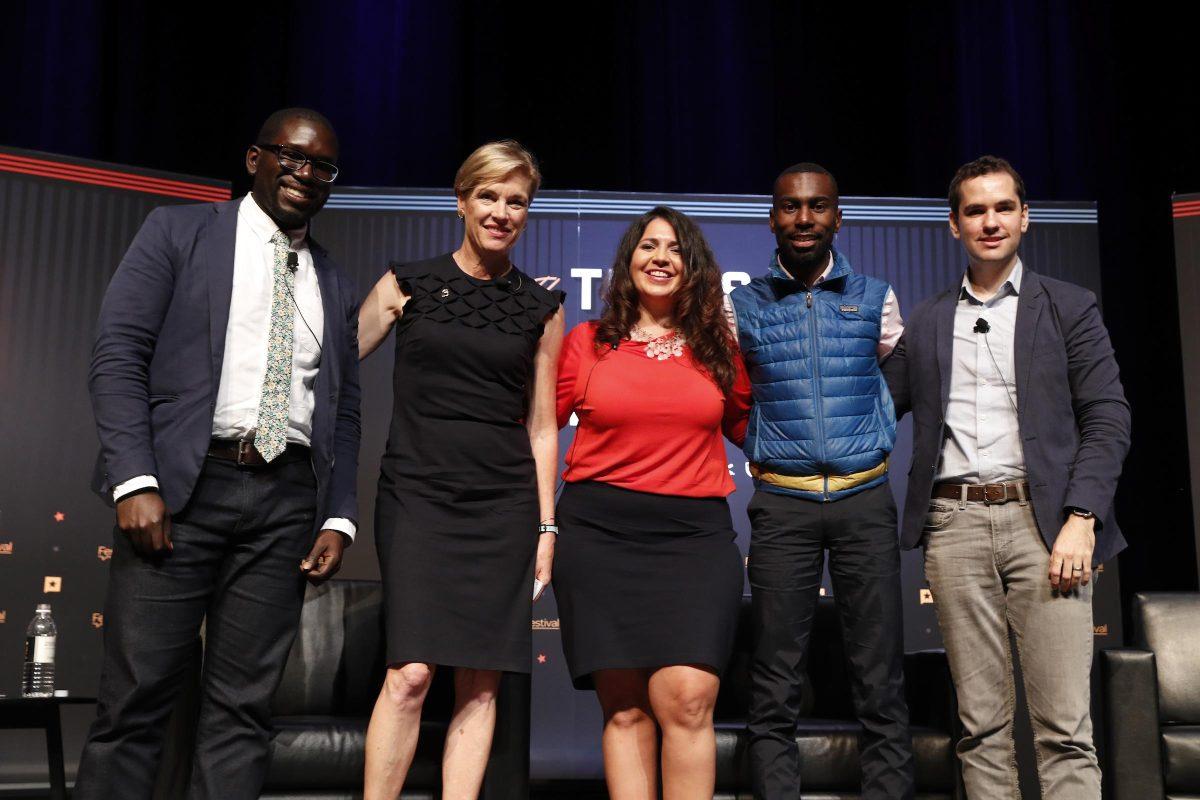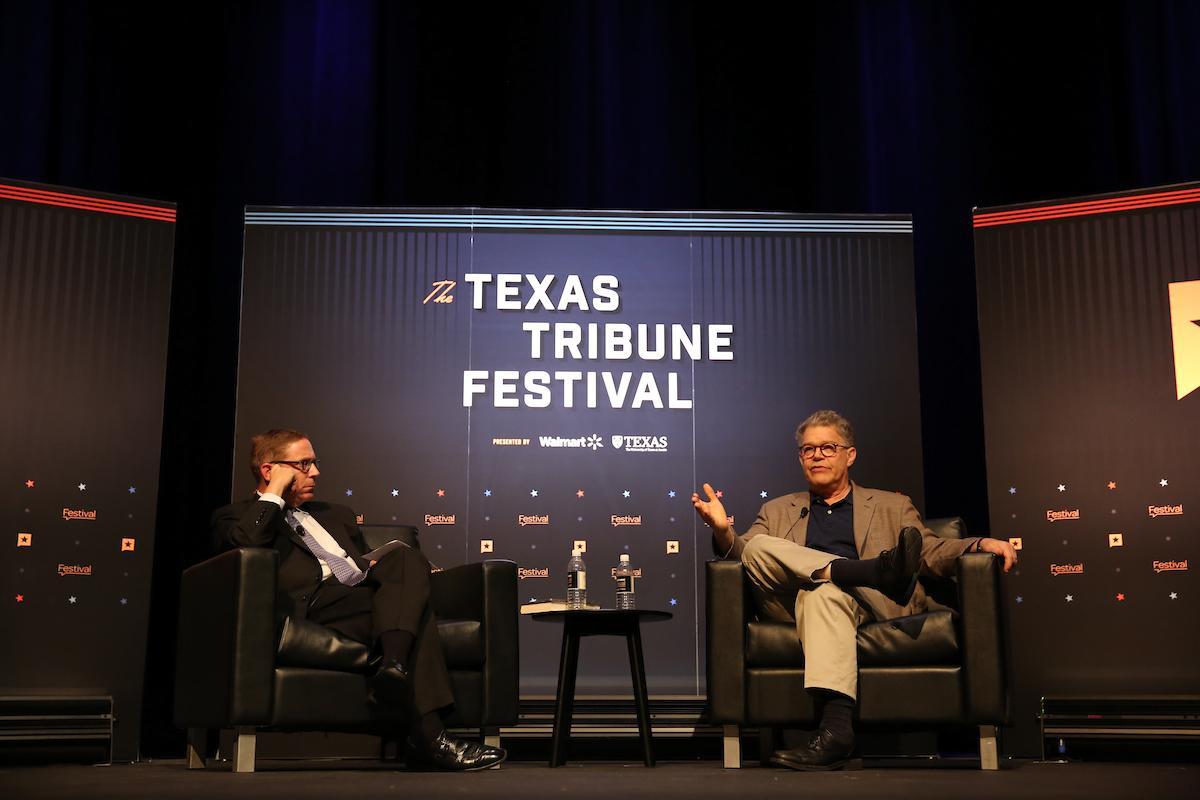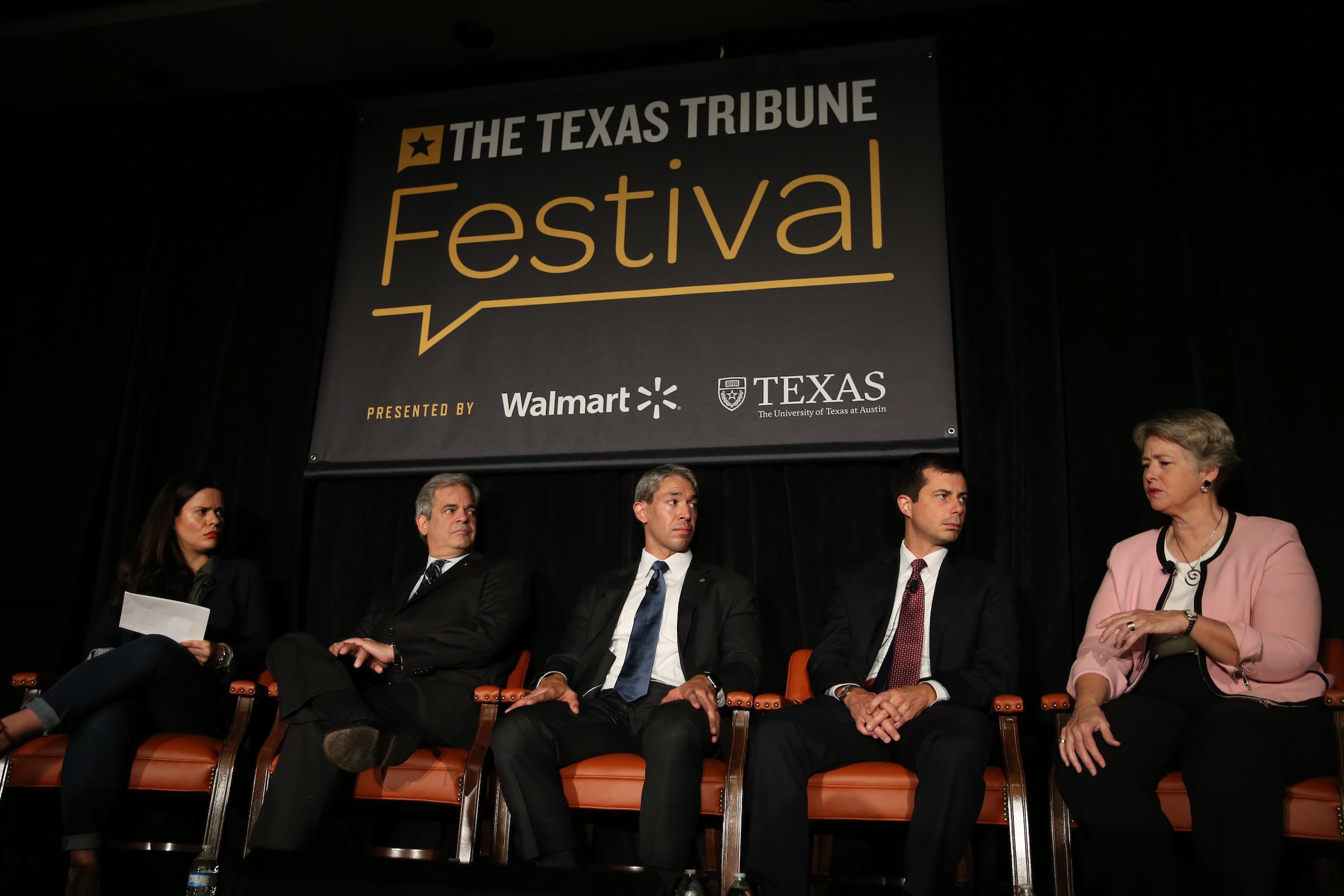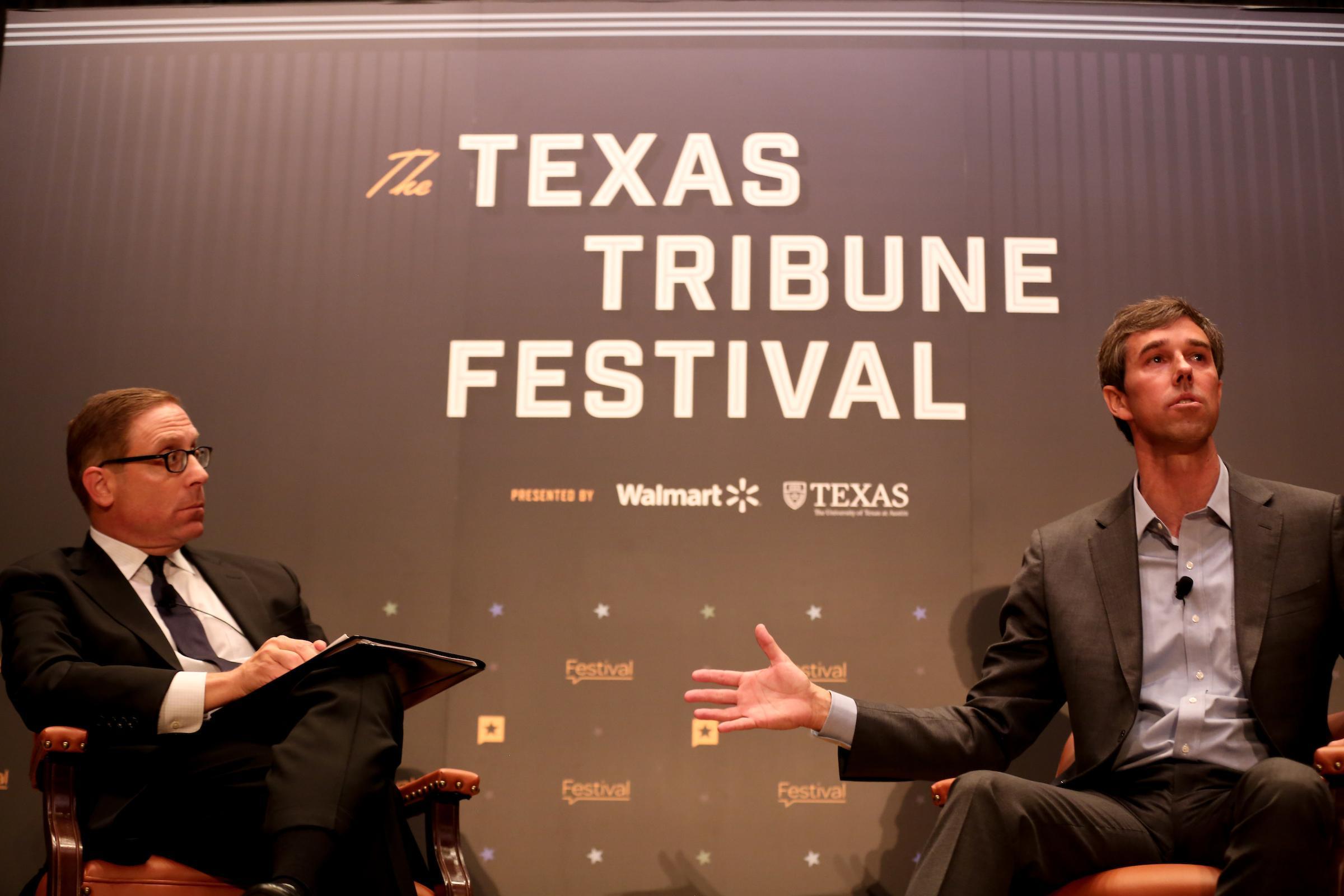Presenting the largest program in its history, the seventh annual Texas Tribune Festival sparked dozens of political discussions throughout the weekend.
Story by Zoya Zia and Rochelle Friedewald
Photos courtesy of The Texas Tribune
As attendees responded to updates in national, state and local politics while also stepping back to process the larger picture, they participated in a growing, reflective dialogue about the state of the union. Although the festival seemed to center around President Donald Trump and his divisive rhetoric, students and professionals considered a diverse range of topics and issues.
ORANGE Magazine has provided a recap of some of the most notable quotes at the festival.
One on One with Al Franken
“I probably like Ted Cruz more than most of my colleagues like Ted Cruz and I hate Ted Cruz.” – Senator Al Franken says, cracking jokes about the Texas senator.
Referencing a chapter in his book, “Al Franken, Giant of the Senate,” Minnesota senator Al Franken recounted his experiences with Senator Ted Cruz and his opinions of him. Not shying away from that topic or from his journey to government, Franken was candid with Evan Smith, CEO of the Texas Tribune. Given his years of experience with Saturday Night Live, it was not surprising to hear the crowd laugh at his responses over the course of the opening session.
When Smith asked Franken whether being a senator is as fun as working on SNL, Franken replied, “Why would it be?” but added that it is the best job he has ever had. Inspired by the late senator Paul Wellstone, Franken said politics “isn’t about power, money or winning for the sake of winning, it’s about working to improve lives.”
Alongside these aspirations to make a difference, Franken emphasized the importance of bipartisanship by pointing out some of his efforts to work with Republicans and Democrats. Towards the end of the session, he choked up talking about Muna Abdulahi, a Somali girl from Minnesota who served as his senate page, and sitting in on her graduation from high school. As he celebrated her achievements, he was struck by the diversity of her class and reminded the audience that diversity is a strength.
Voicing his humor and hope for the future, Franken closed the session with words on the visible consequences of climate change. 50 years from now, he said he doesn’t want his grandchildren to ask, “Why didn’t you do anything about climate change, and also, why are you still alive?”
How Cities are Tackling Climate Change
“Either we pay a certain amount to deal with it now or we’re going to pay a whole lot more to deal with it later.” – Mayor Pete Buttigieg says, referring to the shifting vocabulary of climate change.
At a popular session featuring four elected city officials, mayor Pete Buttigieg of South Bend, Indiana recognized the need to address major climate concerns before it is too late. Kiah Collier, reporter for the Texas Tribune, moderated the conversation with mayor Steve Adler of Austin, mayor Ron Nirenberg of San Antonio and Annise Parker, former mayor of Houston. The speakers all advocated for a bottoms-up approach to protecting the environment.
Buttigieg set the tone for the conversation by calling out the absence of local government in mainstream dialogue about climate change. When federal and state governments create obstacles through inaction or the wrong actions, it is up to cities and their leaders to become more creative, says Buttigieg. Adler, who was present in Paris when the climate change agreements were signed in 2016, argued that major cities around the world are taking initiative together.
As the population grows in urban areas, the impacts of disasters like Hurricane Harvey will only worsen in size and magnitude. Nirenberg said cities are responsible for climate preparedness, regardless of who the president is. He also pointed out that disasters disproportionately affect people of lower income.
In a similar vein, Parker noted that cities have the opportunity to lead by example if they use their own enforcement mechanisms. However, she mentioned that developers and city planners struggle to balance economic prosperity with environmental friendliness. The administration can only make decisions within a limited time frame, preventing them from fully enacting their plans.
Despite these concerns, mayors are confronted by the demand for a sustainable water supply and preparedness for natural disasters. Buttigieg argued that the impacts of climate change are already visible. In the months ahead, Nirenberg called on Texans to be resilient in the face of change since inaction is not an option. The other panelists shared an overall sense of urgency.
Trump and the Resistance
“The fact that we call for justice and not revenge is a testament to the souls of black folk and marginalized people.” – Deray Mckesson says, on his greater commitment to liberation than to punching Nazis.
The popular and vocal Black Lives Matter activist, Deray Mckesson, earned swells of applause for several of his inspirational responses to tough questions on how to harness the power of the anti-Trump movement. The social justice leader was accompanied on stage by other political activists and policy shapers including Crisanta Duran, the first Latina Speaker of the Colorado House, Ezra Levin, co-founder of the progressive advocacy organization Indivisible, and Cecile Richards, the president of Planned Parenthood.
There’s no doubt that the erratic and irrational nature of this administration is the root of the intensified call to action. Still, both Mckesson and Levin reminded the audience to take a step back. “We have to remember that this is deeper,” Mckesson says. “We must fight an ideology that’s bigger than Trump.” Levin echoed similar thoughts, noting that systemic issues have been around longer than this “9 month-old” responsibility some woke up to the morning after the election.
Mckesson elaborated on this all-encompassing resistance by pointing out the damage of the “quiet trauma” black people face in the country due to the less publicized actions of the party in power. He talked about mid-level judge appointments and stricter bail laws, smaller policies that he finds essential, even after Trump’s four years is up.
Richards reflected on the inevitability of a loss in the activist sphere while Levin openly lamented how activism sometimes feels like “standing up and waiting on your turn to lose.” Persistence, Richards remarked, remains key. She cites a case that happened in Austin. Thousands stood to speak at sessions regarding restricting women’s healthcare, called their senators, wrote letters, protested and eventually, were victorious in the June 2016 Supreme Court decision to strike down restrictive Texas abortion law. “People never quit. That’s what creates change.”
But what’s the most effective ways to create this change? Panelists seemed to disagree. Levin said it’s solidarity and lending a helping hand when needed and presenting a unified front. Richards said it’s the power of the vote, while Duran cited using momentum to create pathways within the political infrastructure. Mckesson said it’s changing the minds of the opposition, presenting the issues in a way anyone can retell at the dinner table. Whatever the means, the ends seems to be the same – mobilize long after the departure of Trump.
One on One with Beto O’Rourke
“If you’re like [my wife and I], your kids have become your conscience. [Our kids] at sometime down the road, are going to ask of what we did when everything was on the line for this country.” – Congressman Beto O’Rourke
Based on his appearance at the festival, Cruz’s challenger seems eager to take on his job. Congressman Beto O’Rourke started off his interview by undermining the values the Trump administration highlighted in the past few months. He condemned the proposed border wall, war on the press and the Muslim ban while endorsing universal healthcare, a livable minimum wage and less strict immigration laws. It was clear that he prides himself on being Cruz’s true ideological opposite and anything but a Trump ally. This stance earned him generous applause.
The reason for the widespread public distaste for Congress, O’Rourke claimed, is politicians’ obsession with reelection. In Smith’s company, he swore that if elected, he would not only attempt to implement term limits, but would only serve two Senate terms himself.
This narrative of skirting outside the typical political norm continued when the topic of campaign funding was brought up. O’Rourke stressed PAC money was off the table for him, given, in his opinion, the indirect corruption it allowed his colleagues. It seemed a non-issue for the spunky, young El Paso representative, who had a campaign that out-raised the heavily connected incumbent Cruz last quarter.
Touting a clean and conscious campaign, O’Rourke believes he is more in touch with the ideals of Texas. After all, he said, he travelled to deeply red towns during his Town Hauling Across Texas effort. Cruz, according to constituents he met along the road, was nowhere to be found. O’Rourke reflected that the junior senator had been long absent and out of touch with his constituents.
Still, the Texas conservative political machine is hard to beat. When asked of his chances, O’Rourke’s statement was simple. “The goal is to win.” No concessions, no admissions of underdog status. The self assured perspective of this ex-punk rocker, current Texas progressive beacon of hope resonated heavily with the Tribune Fest crowd. Perhaps they found their blue champion among a sea of red.















































